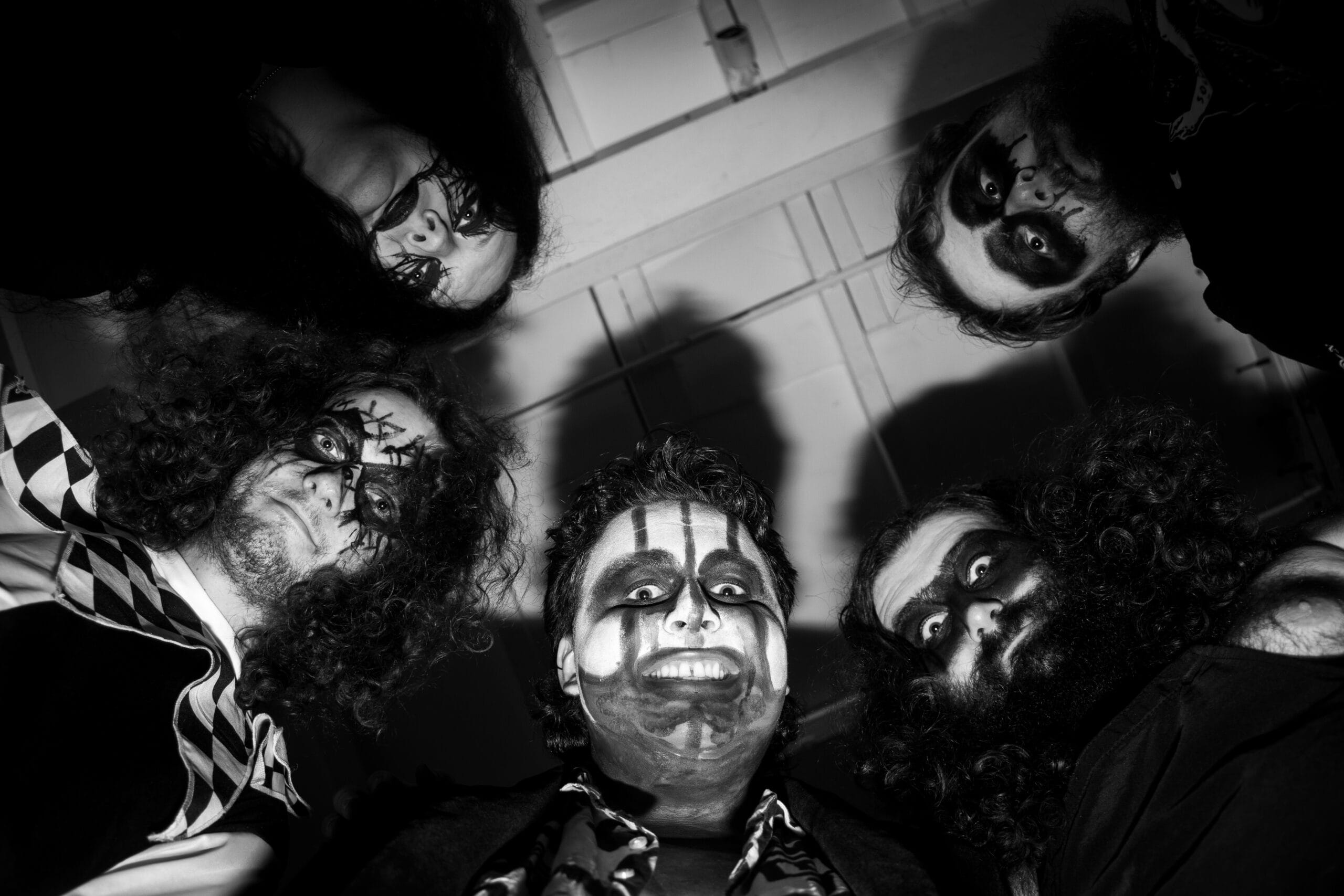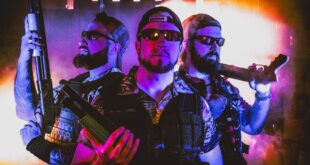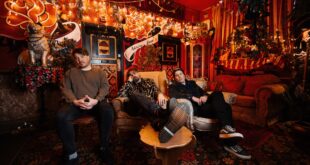 When Danish folk-metallers Huldre released their debut album, ‘Intet Menneskebarn’, at the tail end of 2012, they immediately drew comparisons with the likes of Eluvetie, Korpiklaani and Leaves’ Eyes, among others – especially for their emphasis on the ‘folk’ rather than the metal side of their sound, through the use of traditional instruments such as the violin, flute and hurdy-gurdy.
When Danish folk-metallers Huldre released their debut album, ‘Intet Menneskebarn’, at the tail end of 2012, they immediately drew comparisons with the likes of Eluvetie, Korpiklaani and Leaves’ Eyes, among others – especially for their emphasis on the ‘folk’ rather than the metal side of their sound, through the use of traditional instruments such as the violin, flute and hurdy-gurdy.
Planet Mosh’s resident Viking recently caught up with the band – vocalist Nanna Barslev, guitarist Lasse Olufson,violinist Laura Emelie Beck, bassist Bjarne Kristiansen and drummer Jacob Lund – to talk about their origins, get a track-by-track breakdown of the album and the support that they received from the Danish Musicians’ Union’s bespoke Gateway distribution mechanism.
The band start off by introducing themselves…
Laura: I’m Laura, I’m from Roskilde, a city 30 kilometres outside Copenhagen. I’ve been playing the violin since I was six years old – and I’m a master of forestry. Bjarne, Nanna and I know each other from the world of Viking re-enactment: Bjarne used to be a Viking warrior, and Nanna and I had been playing at several Viking markets with our other band Gny, and hence we knew each other that way around. We had for some time been talking about starting up a folk metal band, as we all felt that combining Nordic folk music with some more heavy stuff would be a great idea… and in 2006 we finally put action behind our words.
Jacob: I’m Jacob and I play the drums. I am from Nykøbing Sj, which is about 70 km from Copenhagen. I started playing drums in 1999, and later I started playing more percussion. I started my career in 2009 when I was in Germany and played with a German medieval band. From there I have joined many different bands within the genres of medieval music, classical and metal. In 2010, I got a mail from a friend telling me that Huldre was looking for a drummer and so I called Nanna!
Bjarne: My name is Bjarne and I’m the bass player as well as co-founder of the band, as Laura mentions. I’ve played bass for around 17 years, in various genres but mostly focused on the harder genres. I discovered folk metal at some point and dreamed for many years of forming or joining a folk metal band: but Denmark is behind on this and there was never a scene for it. A lot of metalheads still laugh at it.. so I was of course thrilled when I finally found some likeminded people in what would become Huldre.
Nanna: I’m Nanna and I am the singer and main writer of the lyrics in Huldre. And as Bjarne and Laura mentioned I’m also the co-founder of the band. I’d been having the dream of making a folk metal band since the 90s and was pleased to join with the other Huldre guys to form the band: as further mentioned we knew each other from other project and connections, it just took us some time to notice that we liked the same genre! I have been singing since childhood and have experimented with folk, rock, metal, electronic folk, etc.
We’re a UK-based website, so forgive us if our Danish is non-existent: what does the name of the band mean and how does it reflect what you’re about?
Nanna: A huldre is a creature from the Scandinavian folklore often described as a female nature spirit – sometimes naked – with the tail of a cow or a fox. She lives in the forest leading people (especially young men) deep into the forest with music and lovemaking and, in worst case, into death.
Laura: We chose the name as it seemed rather appropriate with beautiful women in the band (nudge nudge) and more or less all our songs telling tales about things going on in forests – as well as we think it sounds pretty cool. We forgot to think about how foreigners would pronounce it (try for example to say it in French), but after all it doesn’t contain any æ, ø or å ;)
Bjarne: We like the connection, in thought, between a seductive creature from folklore that lures people (mostly men) to their deaths (if they fail to deliver sexually) as well as generally lure humans away, never to be seen again, via music and merriment, and a band playing folk metal. It just seems to fit. And since our lyrics are all about folklore and nature it seemed appropriate to take name after a folklore creature, rather than start using names from Nordic mythology, of which we don’t sing.
 You sing in Danish: can you talk us through the album, track by track, and explain what the songs are all about?
You sing in Danish: can you talk us through the album, track by track, and explain what the songs are all about?
Ulvevinter
Nanna: (It) means ‘wolf’s winter’, and the song is about the Nordic cold dark winter and how it affects our mood and how we can get through this period.
Trold
Nanna: (It) means ‘troll’. This song is inspired by old folk tales about how a troll attacks a village with a good fight, and he walk whistling away after destroying it.
Skovpolska
Nanna: this means ‘forest polska’, a folk rhythm. A woman walks through the forest and meets a creature with a tale and they try to lure each other, but the woman appears to be the creature.
Brandridt
Bjarne: This song is fairly old and was unfinished for a long time. It “matured” for I think almost two years before we approached it again and managed to finish it in a few sessions.
Nanna: (It) means ‘burning ride’, and the text refers to the Viking age with times of brutality and war – a man rides away from a burning village, with anger fear and the need for revenge. He dies in battle and is lead to the forgotten halls… his mother folds her hands near his grave mound.
Gennem Marsken
Laura: This song was actually named Togsang (‘Train Song’) for a long time as it was written on a train on our way home from a concert. We thought everyone would love if we were jamming all the way to Copenhagen and during the trip this melody just popped out of my head. Fortunately, Nanna recorded it on her telephone so that we could later reconstruct it. When the lyrics were finished Togsang turned out to be a song about the difficulties of separating. Gennem Marsken means ‘Through The Marsh’, as the two characters in the song are trying to cross the marshes – one is riding, one is walking, and as they’re not moving at the same pace they’re being separated more and more both literally and in a more figurative sense.
Vaageblus
Bjarne: This is probably one of our heaviest compositions. As I recall it, I started playing around with a fairly simple black metal riff (originally it was also a lot faster) and then we picked it up in Huldre and started adding some folk music elements to the riffs, especially in the chorus. After Troels (Dueholm Nørgaard – hurdy-gurdy and flute player) joined us we started adding hurdy-gurdy and discovered that a hurdy-gurdy can sound rather evil when you add a few effects to it. That effect made it sound like creaking ice and the lyrics then became about a man trapped under ice.
Nanna: (It) means ‘flame that makes you stay awake’. The song also expresses the Nordic cold winters and suppressed anger.
Havgus
Nanna: This song mixed with folk and blackmetal riffs means sea fog and refers to the sirens.
Spillemand
Laura: A spillemand is a musician playing traditional Danish folk music. My home town, Roskilde, has this annual celebration of traditional Danish folk music (Spillemandsmusik) that lasts a week and where you meet music-playing people all over the city. Growing up hearing 150 violinists in all ages playing ALMOST the same tune at ALMOST the same time has given me a rather traumatic relationship to Spillemandsmusik… so actually Spillemand started out as a joke but has ended up being a great part of our concerts – and I ALMOST love it now ;)
Beirblakken
Bjarne: This song is an old traditional Norwegian song. Back when we were planning our first concert, we were short on songs and we lacked a good opener. Three of our members play in the medieval band Gny and they had this song in their repertoire arranged by them, so it was an easy decision to also play this song in Huldre and rearrange it a bit for a heavy version. We liked the result so much that we decided to put it on the record and it is still usually our first song at a concert, used to set the mood.
Knoglekvad
Laura: Knoglekvad is about a woman in a sacrificial bog throwing bones in circles and having her dreams floating away with the water. We wrote Knoglekvad on an evening where we thought “hey, let’s try make an up tempo song”: so, first we wrote the lyrics and then the rest just happened to pop out of our brains – it’s probably the fastest song writing process we ever had!
Skærsild
Laura: Skærsild is a song about a young girl and her battle between the Pagan and Christian beliefs. The different parts of the song support the story, as she’s asked what she’s wearing around her neck and what she’s doing in the forest at night and finally admits that it’s not a cross but a hammer. We actually spent quite a long time on this song before everyone was satisfied. We even left the first sketches for about a year before we began working on it again – sometimes songs just need time to “mature” before they’re ready to be worked with.
 How important is it for you to retain, in a very prominent role, the use of more traditional instruments such as the violin and the hurdy-gurdy in generating your sound?
How important is it for you to retain, in a very prominent role, the use of more traditional instruments such as the violin and the hurdy-gurdy in generating your sound?
Laura: Since I’m the violinist, I obviously think the traditional instruments are VERY important: but I think that we all agree that if we didn’t have the folky sounds in our overall sound, our music would not be satisfying in the way we think it is now. Our main idea is to play REAL folk metal, you know – folk AND metal, not metal with some generic flute or folk with some extra drums…
Jacob: I think it’s very important to get the folk instruments in there. I also think a lot of the traditional instruments are having a renaissance these years, where they are more and more mixed into rock and metal. Besides, it also looks great on stage to have the traditional instruments there
The album has been receiving rave reviews: you must be very pleased at the media reaction?
Laura: It’s been absolutely overwhelming actually – we thought the album was rather great but never expected such positive reaction from almost everywhere.
Jacob: It has been really great to see all these great reviews, and we are really satisfied with the response.
Bjarne: Most certainly. I had no idea how our music would be received, so of course it’s been a real nice surprise to see the overwhelming response the album has received from all over the world.
Nanna: We are happy that so many people from many different countries appreciate our music, it is a fine surprise for us.
You’ve been compared, very favourably, to folk metal acts such as Eluvetie, Korpiklaani and Leaves’ Eyes: are these fair comparisons to you, and are you flattered by them?
Jacob: It’s always good (to a certain limit) to be compared to big names – but it might stem from the fact that the bigger names use traditional instruments and then people make the connection based on that, rather than on the sound. Personally, I would rather compare our sound to that of Fejd… and I don’t know Leaves Eyes!
Bjarne: Well as Jacob says, to some extent we are of course flattered to be compared to bigger names, but sometimes it also feels weird and out of place. When a Norwegian reviewer compared “Vaageblus” with the sound of Windir, I was both extremely flattered but at the same time I thought “that can’t be right”. It also varies greatly from reviewer to reviewer and I guess there is a need to be able to compare a band with another to give the reader an idea of what to expect. The comparisons that I can mostly recognize are more along the lines of Lumsk and Fejd. The more folky side of folk metal (with the understanding that most folk metal is essentially metal with a hint of folk music sprinkled on top).
I’m very interested in the involvement of the Dansk Musiker Forbund: something we’re very lacking here in the UK is support, especially from government, for the music business – it’s something in which Europe has been so far ahead of us for so many years (I’ve my own experience of it from working in Holland 20 years ago)…can you tell us a little bit about the sort of support bands such as yourselves have received via the ‘Gateway’ label, and the importance this had in bringing you to the stage of your career you have reached?
Bjarne: Well I can try ;) The Gateway label is a gateway – as the name so blatantly states. Their purpose is helping unsigned bands with all the practical stuff surrounding the release of an album – like all the paperwork that has to be done, and help with copyright protection… but they can also get discounts on the actual printing of the album, as well as printing of posters etc. But chiefly they help with distribution. It is because of them that we are on Spotify and the European iTunes as well as fans from around the world being able to order a physical copy from our webshop (i.e. their webshop). Shops that want to sell our album can also order it via Gateway, so the distribution chain is organized through Gateway. They just help you not have to worry about all that and it allowed us to focus more on doing PR – and planning a great big release party for the album!
So, what’s next for Huldre? Any plans for any UK dates to support the album’s release, for example?
Jacob: Yeah! That will be great! But we have no dates…
Bjarne: We would love to play anywhere, but so far there is nothing on the horizon. Let us know if you find a booker that wants to hire us eh? ;)
Given that your first album has been released six years into your career, I take we can’t expect a follow up anytime soon?
Laura: He he he… well that’s a very nice question! We really hope to be able to record our next album sometime during winter 2013/14, but our song writing process is rather slow as we’re a “consensus-band” which means that all band members must be satisfied with a song before it’s considered finished. That means that we can sometimes work on a single song for years, before we think it’s actually ready for people outside the band. But – we already have a few new tracks ready, so maybe we’ll be able to follow our plan…
Bjarne: I agree with Laura, but even if our winter 13/14 plan should fail I highly doubt it will be six years until the next album! We spent a large part of those six years finding ourselves, as well as solidifying into the great lineup that we have today. Once the song writing process started and the Huldre “sound” (as it were) were found it didn’t take that long until we had material for live gigs.
‘Intet Menneskebarn’ is out now and available from http://www.gatewaymusicshop.dk/index.php?route=product%2Fproduct&filter_name=huldre&product_id=422
Official Huldre website: www.huldre.dk
Live photo by Mette Lundbak Kofoed
 PlanetMosh Keeping it Metal
PlanetMosh Keeping it Metal


